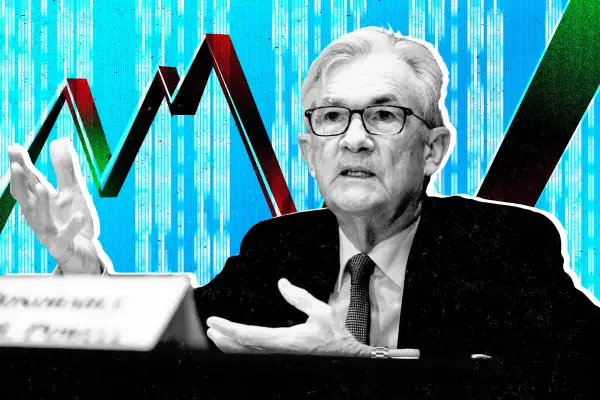The Fed Signals More Rate Hikes Are Coming — Here’s What It Means for Investors
Money is not a client of any investment adviser featured on this page. The information provided on this page is for educational purposes only and is not intended as investment advice. Money does not offer advisory services.

The Federal Reserve has taken a step back from its rapid pace of interest rate increases — but investors aren't rejoicing yet.
The U.S. central banking system raised interest rates by a half percentage point on Wednesday. While that would historically be called a significant hike, nowadays it's considered looser monetary policy, as the last four rate hikes were three-quarters of a percentage point. The latest move brings the federal funds rate, which the Fed has been repeatedly increasing to fight persistent inflation, to a target range of between 4.25% and 4.5%.
Stocks immediately fell after the announcement.
You may think a lower rate hike than investors have become accustomed to would have them celebrating because interest rate increases weigh on the price of financial assets, but Fed Chair Jerome Powell's post-announcement remarks indicated investors shouldn't get ahead of themselves.
The Federal Open Market Committee still anticipates ongoing increases "will be appropriate" in order to get inflation back to the Fed's target rate of 2% over time, Powell said at the news conference.
Why stocks fell after the Fed rate hike
After years of not raising rates, the central bank has been using interest rate hikes as a tool to bring down the skyrocketing prices your wallet has probably felt throughout 2022. High interest rates make it more expensive for consumers and businesses to borrow money, which can bring down spending, demand and, eventually, prices.
But increased borrowing costs means businesses are dealing with higher costs and consumers having less to spend, which can hurt how much companies earn and how they're expected to perform moving forward. That can bring down their stock prices. The price of other financial assets, like bonds and crypto, also tend to take a hit when interest rates rise.
So the fact that Powell made it clear that the Fed intends to keep interest rates high for the foreseeable future isn't great news for investors or their portfolios — hence stocks falling after the news.
"High rates eat into growth and stifle investment, and it’s been tough to process that we could be stuck in this purgatory for months to come," Callie Cox, eToro’s U.S. investment analyst, said in an emailed statement.
What can investors expect moving forward?
Inflation data from the Bureau of Labor Statistics released Tuesday showed that the pace of inflation continues to slow. Consumer prices rose 0.1% between October and November, down from a rate of 0.4% the previous month. Prices are up 7.1% on a yearly basis, compared to an annual rate of 7.7% in October. Both the monthly and the annual rate of inflation were less than economists had been expecting — but that promising data appears to not have been enough to change the Fed's stance for now.
"The Fed has officially shifted rate hikes into a different gear, and we may be nearing the end of hikes. But the job is far from done," Cox says. "The Fed has basically told us today that rates could go even higher, and inflation could take even longer to get under control than what we thought just a few months ago."
That's not good for stocks.
"This should mark the death knell for the most recent bear market rally," says Seema Shah, chief global strategist at Principal Asset Management said via email. "Policy rates have already risen 425 [basis points] this year alone, have further to rise, and will not fall next year — and all this information to digest before even considering the inevitable economic recession that will take a heavy toll on earnings next year."
Shah isn't the only one who says a recession is coming. Though the National Bureau of Economic Research has yet to formally declare a recession, experts have been ratcheting up their fears of an economic downturn all year.
"The Fed still remains coy about the possibility of recession, but with most Fed officials considering risks to be tilted to the downside, it’s fair to say they are far more worried about the economic outlook than they are willing to admit," Shah said.
More from Money:
Stocks Soar After Inflation Falls More Than Expected. Here's What's Next

